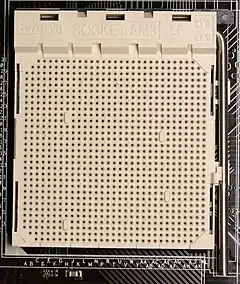 | |
| Type | PGA-ZIF |
|---|---|
| Chip form factors | PGA |
| Contacts | 941 (Socket) 938 (CPU) |
| FSB protocol | HyperTransport 3.x |
| FSB frequency | 200 MHz System clock HyperTransport up to 2.6 GHz |
| Processors | Phenom II Athlon II Sempron Opteron 1380 Series |
| Predecessor | AM2+ |
| Successor | AM3+ |
This article is part of the CPU socket series | |
Socket AM3 is a CPU socket for AMD processors. AM3 was launched on February 9, 2009 as the successor to Socket AM2+, alongside the initial grouping of Phenom II processors designed for it.[1] The sole principal change from AM2+ to AM3 is support for DDR3 SDRAM. The fastest CPU for socket AM3 is the Phenom II X6 1100T.
Like the previous AMD socket, the "AM3 Processor Functional Data Sheet" (AMD document number 40778) has not been made publicly available. The "Family 10h AMD Phenom™ Processor Product Data Sheet" (document 446878) has,[2] but contains only a brief list of features of the Phenom, and does not contain any substantive technical data regarding socket AM3.
Compatibility
Socket AM3 breaks compatibility with AM2/AM2+ processors due to a subtle change in key placement. The AM3 socket has 941 pin contacts in a different layout[3] while AM2+ processors have 940 pins. Tom's Hardware removed the two obstructing key pins from an AM2+ Phenom processor in order to fit it into an AM3 socket. The processor did not work in the AM3 socket, but still worked in an AM2+ socket, suggesting that compatibility issues run deeper than merely the key pins.[4] It is likely because the built-in memory controller in AM2/AM2+ processors only supports DDR2 (unlike AM3 processors, which support both DDR2 & DDR3 memory).[5] In fact, a few motherboards were manufactured that supported both DDR2 and DDR3, however only one type could be used at a time. Despite using an AM3 socket and despite using a northbridge and southbridge found on AM3 motherboards, they support any AM2, AM2+, or AM3 processor.[6]
As AM3 processors also support DDR2, they are backwards-compatible with Socket AM2/AM2+, contingent upon a BIOS update for the motherboard. Manufacturers including Asus,[7] Gigabyte,[8] and others have labeled existing AM2/AM2+ boards as being "AM3 Ready" or similar, indicating that BIOS support is provided for the specified boards. This allows existing AM2/AM2+ systems to upgrade the CPU without having to upgrade any other components.
Heatsink
The 4 holes for fastening the heatsink to the motherboard are placed in a rectangle with lateral lengths of 48 mm and 96 mm for AMD's sockets Socket AM2, Socket AM2+, Socket AM3, Socket AM3+ and Socket FM2. Cooling solutions should therefore be interchangeable.
Socket AM3+
AM3+ is a modification of the AM3 socket. It has one additional pin for new Bulldozer-based AM3+ processors and is backwards-compatible with AM3 processors. It broke backwards-compatibility between AM3+ processors and AM2 and AM2+ motherboards because the processors do not support DDR2 memory.
See also
References
- ↑ The Phenom II X4 810 & X3 720: AMD Gets DDR3 But Doesn't Need It, AnandTech, 2009-02-09, retrieved 2012-01-10
- ↑ Phenom II Processor - Product Data Sheet (PDF), Amd.com, retrieved 2012-01-10
- ↑ MSI Releases AM3 Gaming Series Motherboards, Hothardware.com, 2009-01-22, retrieved 2012-01-10
- ↑ Modding And Overclocking–Doable? : Socket AM3: AMD's Phenom II Gets DDR3, Tomshardware.com, 2009-02-09, retrieved 2012-01-10
- ↑ AMD Phenom II - DDR2 vs. DDR3 Performance, Tweaktown.com, 2009-03-11, retrieved 2012-01-10
- ↑ MSI Unveils DDR2+DDR3 Combo Motherboard, Tom's Hardware, 2009-03-07, retrieved 2014-12-31
- ↑ ASUS Motherboards Now Supports AMD AM3 Processors, Event.asus.com, retrieved 2012-01-10
- ↑ "Gigabyte: Products: Motherboard". Gigabyte Technology.